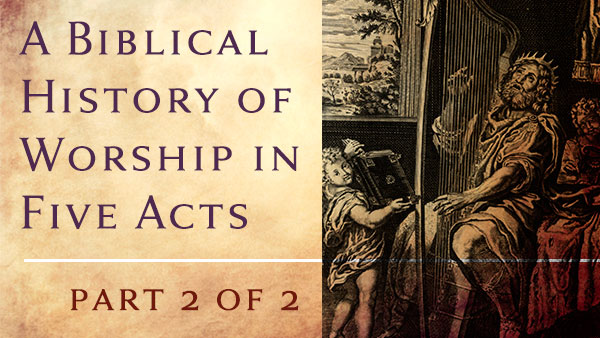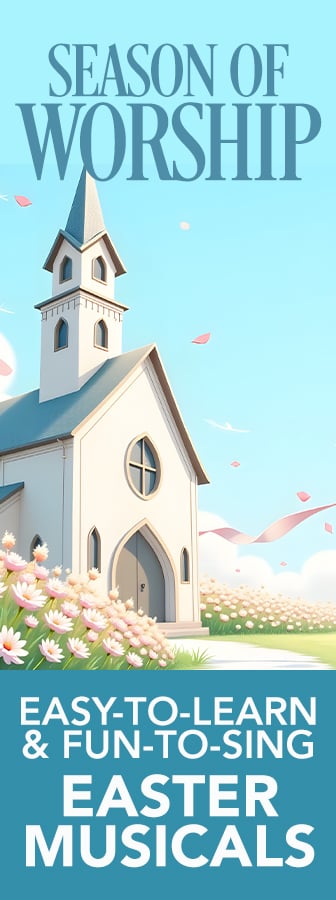
Last week, worship leader and author Wayne Stewart described the first three acts in the biblical history of worship [link to previous blog]. Here's the proverbial "rest of the story":
---
... Which brings us to Act Four: Restored, Yet Not Fully.
The physical representation of the divide between God and Man is the curtain over the Most Holy Place in the Tabernacle and later at the Temple in Jerusalem. As an imposing display of fabric and relational distance from God, it is not to be entered through except by one man, one day a year. Although God cannot be contained by structures or walls, He somehow allows His unique and very real presence in this small place. This is understood by the Jews as both a wonder and a sorrow. Its very presence presses upon their souls as a bitter reverberation from Eden, a distant human remembrance of what once was. For nearly 1400 years it hung as the visual representation of the most tragic effect of our sin: relational disconnection from God and the imposition of an imperfect, ritualistic worship communion with Him.
And then everything changes.
God’s intention is to restore that unbroken fellowship, that perfect relational worship of mankind, so He steps in and provides what He alone can offer. We see the incredible compassion of God toward lost humanity again as He sends the Son to be our substitute, our perfect offering—in our place—once for all mankind (Heb. 10:10-14).
And this is compassion’s climactic moment:
“...when Jesus had cried out again in a loud voice, he gave up his spirit. At that moment the curtain of the temple was torn in two from top to bottom.” (Mt. 27:50-51a)
At the instant of Jesus’ death this imperfect system of sacrifice is now fully satisfied. That’s why the curtain was torn, destroyed. The Most Holy Place (being with God–His dwelling among men) is now open. For all. For all time. What an amazing invitation.
What a great, patient, and persevering love.
Act Four is gloriously redemptive, but there is still one final act to be played out in this great cosmic drama, one final setting that will bring us full-circle, completing and fully restoring what we once had before our traitorous acts of disobedience and self-worship.
This brings us to Act Five: Fully Restored, Perfectly Relational Response.
Even in the midst of the restored beauty and wonder of Act Four, we still long for something. There remains a measure of our connection that will only be finished when all things are finished. We see in the end of all time the re-establishment of a perfectly relational response of worship toward God from Man. While we can note some physical and verbal actions of worship in Scripture passages that give us glimpses of eternity, there is also a sense in which they are not required for the relationship to be whole and good. These actions are not what create or establish the connection. They are simply the grateful and honoring response of a people who lost everything and have had it given back to them at great and awful cost; a price they could never begin to repay on their own.
The Father’s intention has always been--and Jesus’ sacrifice now and forever guarantees--that we can actually know God. Our worship now in this not-yet age is a great invitation of right response to our God, our Creator and our Rescuer.
Songwriter, worship leader, and author Robin Mark helps us here:
“God’s main desire is to draw people close to Him that truly worship... to be in that restored relationship of intimacy where the heart of man is fully given to God and he is fully in communion with Him...to be in such intimate relationship ...that we can walk and talk with Him in the cool of the evening and be so enraptured by who He is, what He has done, and the incredible fact that the Almighty God of the universe wishes to commune with us continually, (that) our hearts overflow with worship.” *
Which brings us back around to our assertion that to the extent we view worship solely as what happens for about an hour a week and what we like or don’t like about it we are actually “trading down”—making an incredibly bad deal. One could rightly wonder if we are trading away the unbelievable privilege and invitation of meeting with, honoring, serving, and knowing God for the worship packaging it often comes in.
Let’s make this painfully simple. God deserves much more than an hour a week. We were designed for a worship that is more than that. We were redeemed for something much bigger. We are called to something significantly, substantially better. Sometimes, when I look at how small my worship can be I wonder if I really understand much at all regarding Who we were made for, what we gave away, and then had graciously and awfully returned to us again.
This first core failing of a smaller worship, the first good reason we run from it and toward bigger things, is that it’s a mismatch of size. It’s a failure of scale, leading to a devaluing of God’s glory and a terribly truncated experience of His intended presence in our lives.
Let me ask you: when you think of all that God has done to draw you near to Him, are you satisfied with what you give Him in return, with regards to worship? Please hear me, this isn’t some kind of pastoral guilt trip. It’s an incredible offer that you want to step into more and more, in every aspect of your life. God’s nature demands this kind of whole-life response of worship. It is also His gracious, loving heart that extends it as an invitation, granting us the beauty of fellowship with Him in the midst of it all.
He is the King. There is no question as to His position and authority. It is equally clear that He is not the kind of King that uses His position to keep all others at a distance. Instead, He is the King who takes in paupers and rebels, turning them into princes, princesses, sons, and daughters. He is the Groom, choosing and adorning His bride. Don’t trade that kind of gracious summons away for lesser things, smaller things.
* Robin Mark, Warrior Poets of the Twenty First Century (Ambassador Publications, 2007), Pg. 97. The author is actually summarizing thoughts from AP Gibbs’ work “Worship—the Christian’s Highest Occupation.”
---
Wayne Stewart has been serving as Worship Arts Pastor at Christ Community Church in Ames, Iowa (ccames.org) since 2010. For more than two decades, his passion has centered on helping people grow into a bigger understanding and experience of worship—the privilege and power of knowing, meeting with and walking with God. You can catch a deeper sense of Wayne’s heart and teaching at worshipisnosmallmatter.com. His new book, “Bigger < Maybe Our Worship Is Just Too Small” offers both leaders and laypersons biblical scholarship and practical insight and is available in both paperback and Kindle format at Amazon.com. Additionally, the content is available online at Bigger Online.











